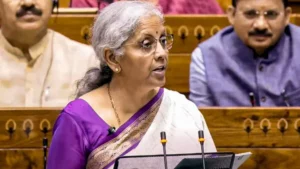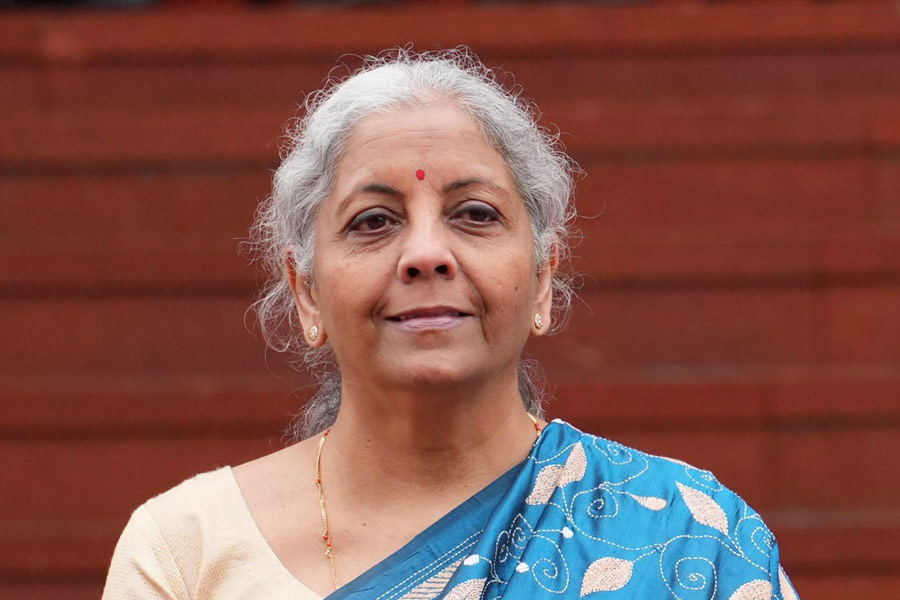Ironically, the finance minister does not address inequality in her address to the nation. India is sadly gaining rapidly in inequality as the poor grow poorer and the rich gain wealth.
The budgeting process, a pivotal tool often influenced by political factors, strategically distributes funds to areas that strengthen the government’s consolidation. This process is not just a financial exercise but a clear demonstration of quid pro quo in the political arena. It underscores its significant role in shaping the economic landscape, making it a tool of utmost importance.
The unemployment crisis in India has reached alarming levels, with the overall rate soaring to 9.2%. The situation is even more dire for the youth, with a staggering 13% of graduates and 12.5% of postgraduates being unemployed. Shockingly, the women’s unemployment rate stands at a staggering 22.7%. This palpable crisis, which is evident in the flood of job applications inundating the system, underscores the urgency of the issue and the need for immediate action.
– To fill 16000 police officers’ vacancies, 48,00,000 applied.
– To fill up 600 vacancies of clerical staff, 24000 applied.
– In Gujarat, there was a need for five people, and 1000 of them applied for the job.
– In MP, the need for 15 people was met with 11000 applications.
– For staff selection, 7500 jobs were met with 25,00,000 applications.
According to the report, 83% of Indian youth are jobless, a staggering figure that the government is not ignoring. In response, they have planned to train them as interns with a Rs 5000 monthly stipend. They have selected 500 industries, a meagre group to facilitate the arrangement while deliberating with the directors on the future course of action.
This initiative, though facing challenges, is a beacon of hope in the fight against unemployment. The government’s proactive steps to address this crisis should instill a sense of hope and confidence in the readers, demonstrating the government’s commitment to tackling this issue. Undoubtedly, one has to think beyond the lines to outline the genuine purpose of the manoeuvre.
Production-linked incentives (PLI) are more vibrant in the organised sector, for they can accomplish this through the application of technology; banks and other related institutions can use cyber-related tech without using a workforce. The unorganised sector (MSME) needs a workforce in large quantities and hence gains on employee-linked incentives (ELI) but loses on the excess workforce.

Almost a whopping 90% of our workforce find employment in MSMEs. However, the need to set the ailing, unorganised sector right was set ablaze due to the demonetisation carried out on his recommendation by our honourable PM.
With inflation staggering at 3.4% in the Wholesale Price Index (WPI), 5.1% in the Consumer Price Index (CPI), 9.4% for food, and much more as you travel inwards in the countryside, the impact is stark. It starts to be felt when you need to buy essential requirements from the marketplace. It gets sensed more when you are unable to afford your basic needs. The slender balance between your income and expenses is under severe strain, making it eventually imperative for you to choose cheaper foodstuff. This situation raises concerns about the increasing cost of living for readers.
The bank needs to be vigilant about interest rates and maintain them at 6.5% to compensate for inflation. This would tide over the severe inflationary pressures that could prove fatal to the nation. The standard deduction for Income tax has marginally increased from 50,000 to 75,000. The total income, along with the tax rates, are listed as follows:
| S.No | Total Income (In ₹ ) | Tax Rate |
| 1 | 0 to 3,00,000 | 0% |
| 2 | 3,00,001 to 7,00,000 | 5% |
| 3 | 7,00,001 to 10,00,000 | 10% |
| 4 | 10,00,001 to 12,00,000 | 15% |
| 5 | 12,00,001 to 15,00,000 | 20% |
| 6 | Above 15,00,000 | 30% |
The strength of Indian income taxpayers amounts to over 2.5Cr, which makes them a rare commodity compared to the Indian population of 140Cr. They account for only around 2.2% of the voting population. They could feel a minuscule lowering of their taxes, but for the government, it could be too marginal.
The two crutches (Allys) on which the government survives have been adequately funded but fell below their expectations. While Andhra Pradesh’s new capital township, Amaravati, was provided with ample funds, it has been learnt that the state obtains the same in the form of loans, which could boost their debts considerably. The arrangement for the payback remains to be seen. Bihar has been denied special status, but it was amply funded for infrastructure development, including roads and railways.
Ironically, the finance minister does not address inequality in her address to the nation. India is sadly gaining rapidly in inequality as the poor grow poorer and the rich gain wealth. Luxurious items are purchased, but small items need more buyers. The demand is shrinking as people with low incomes have more basic needs to fulfil. Incidentally, the government revenues in the form of income taxes are more from the 1.5 crore people composed of the bulk of the higher middle class and a section of the affluent class. They are smart enough to employ people with tax-evading skills to manage their taxation.
Education is critical for employment generation. The government has allocated Rs 1.48 lakh crore which would be meaningless with 35 lakh pupils dropping out of school. The allocation could be in excess unless they are coaxed to rejoin the school. It would be worthwhile to inquire about the fate of ₹1.12 lakh Cr allocated in the previous year. If the amount falls short, the ministry has to articulate the need for extra funds and outline its proposal to add value to the money spent. Expenses incurred in education can easily find their way back to our coffers if utilised ingeniously.
Despite the 12.9% increase in healthcare allocation, India needs to meet the target set by the National health policy of 2.5% of the GDP. Healthcare requires immediate funds to regress in times of epidemics, which would entail central government funding. More importantly, this may have yet to be considered during budget allocation in the preceding years. Countries in Europe spent almost fourteen times the amount on health retention, while India waits for another COVID-like illness to embark.
The statistics clearly outline the disparity in wealth. The bottom 50% of the people own just 3% of the national wealth and 13% of the national income. 5% of them are in utter poverty, and 17% to 25% are in regular jobs. India ranks 111th on the Hunger Index, with 83 crore people having access to free meals. Whereas when the top 1% controls 40% of the wealth in India, the 50% of the poorest destitute pay 67% of the GST. With 35000 MSMEs closing down shops, joblessness will grow in abundance, and scores of people clinging onto the jobs will be rendered jobless.
The PM has set up a politically linked railway expenditure for high-tech trains and appropriate railway stations, and he has used it in awareness programmes multiple times. A series of recent railway accidents should be mentioned in the honourable minister’s budget speech, including her plans to rehabilitate and repair the damaged rakes and the additional cost to be incurred in order to sense another train in the route using a kawach. This has been identified by trained folks in rail servicing R&D.
Here again, politics has gained precedent over trivial matters. However, nothing beyond your brief is acknowledged by the PM in your address.
Despite a 48% employment of labour in agriculture, the finance minister refused to mention farmers inher address, lest it could earn the ire of the PM. MSP, too, was eased out of her speech with none of the GST for farm products, finding a waiver mentioned as well. Nevertheless, the people employed come under severe excess and could be classified in the quota of disguised unemployment.
The budget speech is gradually losing prominence in our various circles. First, contentious issues like unemployment, inflation, etc., are mentioned in all 77 budget speeches. Second, the implementation is obliterated as the same fade away from public memory until the next budget session gets underway.
The views expressed by the author are strictly personal.
As an independent media platform, we do not take advertisements from governments and corporate houses. It is you, our readers, who have supported us on our journey to do honest and unbiased journalism. Please contribute, so that we can continue to do the same in future.

